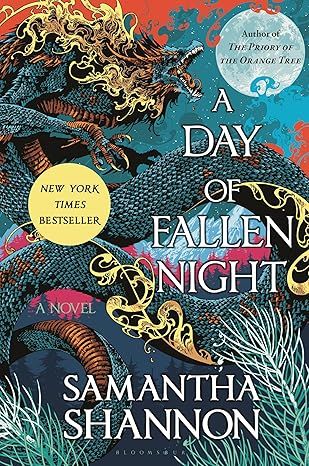A Day of Fallen Night (The Roots of Chaos)
4.5
-
3,094 ratings
The New York Times bestselling, stunning, standalone prequel to The Priory of the Orange Tree, now in paperback.
“A magnificent, sweeping epic. Shannon has created a world rich in intricate mythology, beautifully realized and complex.” -Jennifer Saint, bestselling author of Ariadne
In A Day of Fallen Night, Samantha Shannon sweeps readers back to the universe of Priory of the Orange Tree and into the lives of four women, showing us a course of events that shaped their world for generations to come.
Tunuva Melim is a sister of the Priory. For fifty years, she has trained to slay wyrms – but none have appeared since the Nameless One, and the younger generation is starting to question the Priory's purpose.
To the north, in the Queendom of Inys, Sabran the Ambitious has married the new King of Hróth, narrowly saving both realms from ruin. Their daughter, Glorian, trails in their shadow – exactly where she wants to be.
The dragons of the East have slept for centuries. Dumai has spent her life in a Seiikinese mountain temple, trying to wake the gods from their long slumber. Now someone from her mother's past is coming to upend her fate.
When the Dreadmount erupts, bringing with it an age of terror and violence, these women must find the strength to protect humankind from a devastating threat.
Kindle
$8.97
Available instantly
Audiobook
$0.00
with membership trial
Hardcover
$17.94
Paperback
$16.48
Ships from
Amazon.com
Payment
Secure transaction
ISBN-10
1639732993
ISBN-13
978-1639732999
Print length
880 pages
Language
English
Publisher
Bloomsbury Publishing
Publication date
March 04, 2024
Dimensions
6.1 x 2.15 x 9.15 inches
Item weight
1.81 pounds
Frequently bought together
Popular highlights in this book
‘I don’t need anyone to save me. All I ever ask is that you not abandon me.’
Highlighted by 381 Kindle readers
Still, she imagined the loss of a loved one would hurt like an arrowhead lodged in the body. Life would grow and twine around it, but it would remain, always hurting.
Highlighted by 364 Kindle readers
Her name was Dumai, from an ancient word for a dream that ends too soon.
Highlighted by 347 Kindle readers
Product details
ASIN :
B09XBX2Y6X
File size :
5298 KB
Text-to-speech :
Enabled
Screen reader :
Supported
Enhanced typesetting :
Enabled
X-Ray :
Enabled
Word wise :
Enabled
Editorial reviews
“Epic in scope . . . The heroes shine in their uniqueness, with diverse family dynamics interwoven throughout and representation ranging from queer lords and warriors to genderfluid alchemists . . . This is expansive, emotionally complex, and bound to suck you in.” ―Kirkus Reviews, Starred Review
“Shannon artfully builds on the world of The Priory of the Orange Tree with this masterful standalone prequel. … it's an expansive epic … Shannon skillfully grounds high-stakes fantasy action in human emotion and a mature exploration of duty, bodily autonomy, identity, and motherhood. Series fans and any reader looking for queernorm fantasy will be thrilled by this self-assured adventure.” ―Publishers Weekly Starred Review
“This magnificent, Sapphic fantasy novel…is going to sweep you off your feet.” ―Glamour
“The engrossing new story promises to deliver more character-driven, emotionally complex adventure and intrigue.” ―Cosmopolitan
“A Day of Fallen Night, Samantha Shannon's sprawling, breathtaking prequel to The Priory of the Orange Tree, soars as it expands her beautiful world of warrior nuns, queens and dragons with a new era of catastrophe and heroism ... demonstrates that Shannon's magnificent world contains a wealth of intriguing stories.” ―Shelf Awareness, Starred Review
“[A] fantasy trilogy in one volume, allowing for deep exploration of each protagonist as they navigate a brutal cataclysm. This richly detailed epic roars to a satisfying conclusion; both Priory devotees and newcomers are in for a treat.” ―Booklist, Starred Review
“A Day of Fallen Night is an absolutely stunning work of fantasy that takes place five hundred years before Samantha Shannon's The Priory of the Orange Tree. This book has it all - a vividly realized world, political intrigue, romance, and an array of incredibly strong female characters, each with their own unique voice and narrative that are seamlessly woven together. This book may be a beast, but it just sucks you in and doesn't let you go until the last word.” ―Powell's Best Science Fiction/Fantasy 2023
“Fantasy fans, rejoice: The beloved Samantha Shannon is bringing readers back to the world of bestseller The Priory of the Orange Tree in this standalone prequel, A Day of Fallen Night. Set in the same universe as the feminist epic, steeped in dragonriders and intricate mythology, A Day of Fallen Night follows four women and the ways in which their choices shape Shannon's narrative forever.” ―ELLE, 65 Best And Most Anticipated Books Of 2023!
“In this stunning epic fantasy, lush with detail and nuance, Shannon weaves a tale of three powerful women that intersect in the most thrilling ways. Huge in scope, rich with emotion, and gorgeously queer, A Day of Fallen Night is the Roots of Chaos book fans have been waiting for. Shannon is simply a master of the genre'” ―C. S. Pacat, New York Times-bestselling author of Dark Rise
“Like a dragon in flight, Samantha Shannon takes you soaring through a tale full of fire and spirit. It is in that freefall that I fell utterly in love with these new characters. The novel draws strength from the power of a woman's choice, giving the characters a depth of fortitude that is masterful in its craft and execution. Shannon lays bare the intricacies of the world she's created with sublime skill, enrapturing the reader with political intrigue and momentous action, cleaved through with heart and passion. Simply put, Samantha Shannon hasn't just done it again, she's surpassed all that has come before and cemented herself as a legend of the genre.” ―Saara El-Arifi, Internationally-bestselling author of The Final Strife
“Epic in scope, yet careful and tender in its depiction of personal grief, A Day of Fallen Night shows the heights of courage and depths of hope that people can find during terrifying, destruction chaos. A triumph of a book.” ―Helen Corcoran, author of Queen of Coin and Whispers
““A Day of Fallen Night has what readers want in high fantasy: strong women, masterful worldbuilding and, of course, dragons. Samantha Shannon's prequel to her highly acclaimed The Priory of the Orange Tree, is a welcome return to the lands and skies of this mystical world.”” ―Barnes & Noble “Poured Over” Podcast
“· “the Absolute Best Kind of Expansive Fantasy Epic … Shannon's immense and immersive worldbuilding [tells] a story that spans both kingdoms and generations … grounding sweeping, apocalyptic events in emotional, deeply human stories of connection, love, and agency … Like Priory before it, the world in A Day of Fallen Night is effortlessly diverse and inclusive … what makes [A Day of] Fallen Night sing is the way it uses its fantastical framework to explore complex issues of love and loss, sacrifice and duty, bodily autonomy, and motherhood. The rare fantasy epic where every page not only builds on what came before-but what comes after as well.”” ―Paste Magazine
Read more
Sample
Prologue
Unora
Her name was Dumai, from an ancient word for a dream that ends too soon. She was born in the last glow of the Sunset Years, when every day poured soft as honey in the city of Antuma.
One spring, a young woman stepped through its gate, brought there by a forbidden wish.
She claimed to remember nothing of her past – only that she was called Unora. No one could have guessed, from her dusty clothes and callused hands, that her father had once held the power to set the whole court fluttering in his wake.
No one could have guessed what she was in the capital to do.
In those years, it was hard to farm the dry interior of Seiiki. Since the gods’ retiral, long droughts had afflicted the island. Away from its shrivelled rivers, the ground thirsted.
Had the Governor of Afa been like other men, he would have lamented his post in a dust province. Instead, he laboured every day to channel water to its fields. Each time he returned to court, Empress Manai deemed him more inventive and hardworking. She gave him a mansion in the capital, where he placed his daughter, Unora, under the care of a nursemaid.
But Empress Manai had long been unwell, and her ailment did not ease. She renounced the throne before her time and retired to Mount Ipyeda, leaving her only child to be enthroned.
Though Prince Jorodu was still young, he had learned from his mother. In his first act, he summoned the Governor of Afa and made him River Lord of Seiiki, overlooking all others in his favour. For a year, he was the most trusted and beloved of the boy emperor.
So it shocked no one when he was suddenly banished, accused of having roused a god to make his province thrive. One family surrounded the emperor, and they allowed no one else close. Not for long.
Their servants found Unora and flung her into the dark street. At nine, she was left a destitute orphan. Her nursemaid stole her back to Afa, and for ten long years the world forgot them.
Unora worked the fields once more. She learned to bear the sun. Without her father, water no longer flowed. She planted millet and barley and wheat, folding seed into dry earth. She lived with a burning throat and a dull ache in her bones. Each night, she walked to the shrine on the hill, the shrine for the dragon Pajati, and clapped.
One day, Pajati would wake. One day, he would hear their prayers and bring rain to the province.
Over time, she forgot her days in the capital. She forgot what it was like to hear a river, or to bathe in a cool pond – but she never forgot her father. And she never forgot who had destroyed them both.
The Kuposa, she thought. The Kuposa undid us.
In her twentieth year, death came to the settlement.
The drought lasted for months that year. The fieldworkers pinned their hopes on their well, but something had tainted the water. As her old nursemaid vomited, Unora stayed at her side, telling her stories – stories of Pajati, the god they all willed to return.
The villagers took the body away. They were next to die. By the sixth day, only Unora was left. She lay in the stubble of the crop, too thirsty to fight, and waited for the end.
And then the sky opened. Rain touched the ground that had long been a deathbed – a patter that became a downpour, turning the dry earth dark and sweet.
Unora blinked away droplets. She sat up and cupped the rain in her hands, and as she drank, she laughed for joy.
The storm left as suddenly as it had come. Unora stumbled towards the Creaking Forest, soaked in mud from head to foot. For days, she sipped from leaves and puddles, finding little she could eat. Though her legs shook and an old bear stalked her, she kept on following the stars.
At last, she came to the right place. Behind the trickling remains of a waterfall, the white dragon Pajati slumbered – Pajati, guardian of Afa, who had once granted wishes to those who paid a price. Unora sought the bell that would wake him, faint with hunger and thirst.
Now she would leave her fate to the gods.
Deep was their slumber in those years. Most had withdrawn into undersea caverns, beyond human reach, but some had gone to sleep on land. Though Seiiki grieved their absence, disturbing them was the highest of crimes. Only the imperial family had that right.
Unora found she had no fear, for she had nothing left to lose.
The bell was taller than she was – the bell that would wake the guardian, not to be touched on pain of death, green staining the bronze. Unora approached it. If she did this, she could be killed. If she failed to do this, there was only sickness and starvation.
I deserve to live.
The thought came like a thunderclap. She had known her worth since the day she was born. Exile had beaten her into the dust, but she would not stay there. Not one day more.
She struck the bell. After centuries of silence, it tolled the night in two.
Pajati answered its call.
As Unora watched, the god emerged from the cave, all the many coils of him. He was white all over, from his pearly teeth to the gleaming pallor of his scales. She let her knees give way and pressed her forehead to the ground.
‘The star has not yet come.’ His voice rushed like wind. ‘Why do you rouse me, child of earth?’
Unora could not sign her words. No one could. When Pajati offered his tail, she grasped it with shivering hands. His scales were like wet ice.
It was not for her to ask gifts of the gods. That was the privilege of empresses, of kings.
‘Great one, I am a woman of your province. I come from a village stricken by drought.’ She clung to her courage. ‘I beg you for rain, king of the waters. Please, send us more.’
‘I cannot grant that wish. It is not time.’
Unora dared not ask him when the time would come. It had already been too long. ‘Then I ask for a way to enter the shining court of Antuma, so I might beg the emperor to save my father from exile,’ she said. ‘Help me move the Son of the Rainbow to mercy.’
Pajati showed his teeth. He was the brilliance of the moon, his scales the milk and tears of night.
‘There is a price.’
It was no small price to pay, where water and salt were so precious and rare. Unora closed her eyes. She thought of her father, the dead in her village, her solitude – and even though her lips were cracked, her temples light from thirst, a drop seeped down her cheek.
Snow Maiden wept for the great Kwiriki, and he understood humans had goodness in them, her nursemaid had told her. Only when she wept for him could he know that she had the sea in her, too.
The warning from her childhood beat within her. It urged her to accept the death that waited in her wake. But the god of her province had already spoken:
‘One turn of the sun it will last, and no more.’
He gave her a tear in return, dropping it into her palm like a coin. She lifted the silver glow to her lips.
It was like biting into the blade of a sickle. That drop swept a decade of thirst from her throat, utterly quenching her. Pajati took her tear with the tip of his tongue, and before he could tell her the whole of the bargain, Unora fell to the ground in a faint.
The next day, a messenger found her still there. A messenger from the shining court.
The women of the palace looked nothing like her. Their hair trailed almost to the floor, the fishtails of their robes some way behind them. Unora shrank from their stares. Her own hair was cropped to sit on her shoulders, her hands roughened by a decade of toil. Whispers chased her to the Moon Pavilion, where the Empress of Seiiki waited in a wide, dark room.
‘I dreamed there was a butterfly asleep beside those falls,’ she said. ‘Where did you come from?’
‘I don’t remember, Your Majesty.’
‘Do you know your name?’
‘Yes.’ Her name was all she had left in the world, and she meant to keep it. ‘I am called Unora.’
‘Look at me.’
Unora obeyed, and saw a pale woman about her own age, with eyes that put her in mind of a crow, curious and shrewd beneath a crown of whelks and cockles. Two crests adorned her outer robe. One was the golden fish of the imperial house, her family by marriage.
The other was the silver bell of Clan Kuposa.
‘You are very thin,’ the Empress of Seiiki observed. ‘You have no memory of your past?’
‘No.’
‘Then you must be a butterfly spirit. A servant of the great Kwiriki. They say his spirits fade if they are not always close to water. Your home must be here, in Antuma Palace.’
‘Your Majesty, my presence would shame you. I have nothing but the clothes I stand in.’
‘Fine garments, I can have made. Food and drink, I can provide. What I cannot give is the wit and talent of a courtier,’ the empress said with a wry smile. ‘Those things must be learned with time, but that I can give, too. In return, perhaps you will bring my family luck.’
Unora bowed to her, relieved. This Kuposa empress had no inkling of who she was. If she was to reach the emperor, she would have to ensure that none of them did.
Unora bided her time. Time had been a rare gift in Afa. The courtiers spent theirs on poetry and hunting, feasts and music and love affairs. These arts were unknown to Unora.
But now she had all the food she could eat, and all the water she could drink. As she healed from the long chew of poverty, she grieved for those left in the dust, while the nobles soaked in private baths, helped themselves to water from deep wells, and rode in pleasure boats along the River Tikara.
She meant to make things better. Once she reached her father, they would find a way.
Everyone at court believed Unora was a spirit. Even when the handmaidens ate together on the porch, when it was impossible not to discuss the beauty of Mount Ipyeda, only one of them – a kind poet, round with child – ever spoke directly to her. The others just watched, waiting for evidence of powers.
The loneliness ached most on summer nights. Sitting in the corridor, the handmaidens combed their hair and spoke in low voices, skin kilned by the heat. Empress Sipwo would often beckon Unora, but she always shied away.
She could not ask a Kuposa for succour. Only Emperor Jorodu could help.
Summerfall came and went. As autumn reddened and gilded the leaves, Unora waited for the emperor, who seldom emerged from his quarters in the Inner Palace. She needed to speak to him, but only once had she caught a glimpse, when he came to visit his consort – a flash of collar against black hair, the dignified set of his shoulders.
Unora kept biding her time.
Empress Sipwo soon grew bored of her. Unora could not sew with cloud or spin a handsome prince from sea foam. Pajati had given her no power she could touch. She was sent to the other side of the Inner Palace, to a cramped room with a leak. Though a servant kept her brazier full, she could not shake the cold.
In Afa, people had danced to keep warm in the winter, even when their bodies protested. It was time to start again. The next day, she rose before dawn and walked to the roofed balcony that enclosed the Inner Palace. The north side faced Mount Ipyeda.
Unora stood before it, and she danced.
The Grand Empress had gone to that mountain. Unora craved the same escape. If she failed to reach the emperor, she would have to find some other way to save her father – but she had no idea where to begin. For the time being, she would escape into this, her winter dance.
Now change had come, it would not stop. One night, a note slid under her door with two white leaves from a season tree, both impossibly perfect.
Sleepless, I wandered before sunrise
hopeless and forlorn, before I saw
a maiden spun from moonlight, dancing.
Entranced, I dream and walk past nightfall
waiting for first light, when I still hope
to glimpse her as she dances, laughing.
Someone had seen her. It should have been embarrassing, but she was so lonely, and so cold. She told the messenger to return, asking for an inkstone, a brush, a water dropper.
Water could not be squandered on ink in the provinces. It still filled her with guilt to use it, but her father had taught her to write, scratching characters into the earth. Her brush mirrored the ebb and flow of the first poem, and she found that it was effortless.
Restless, I dance before each sunrise,
cold within my skin. I never saw
my witness in the shadows, writing.
Haunted, I shy away from morning
wondering who sees, yet I must still
go dancing in the snowfall, smiling.
When it was done, she tucked her poem under the door, and the messenger took it away.
At first there was no answer. Unora resolved not to think of it, but the longing, once woken, was hard to press down – longing for someone to see her. A second poem rewarded her patience, the evening before the Day of the Sleepless. Unora held it to her lips.
Snow fell over the city. More poems arrived, often paired with gifts: fine brushes, a gold comb adorned with a seashell, fragrant wood for her brazier. When two of the handmaidens passed her new lodgings, smiling at her apparent misfortune, Unora smiled back without bitterness, for she knew that love papered the floor of her room.
When he came to her, she invited him in. From the way he was dressed, he could have been anyone. She led him across the room, to where moonlight fell across the floor. His slender hands, untouched by toil, made short work of her sash. When he felt her eternal chill, he tried to warm her fingers with his breath. She smiled, and he smiled back.
That was the first of many times. For weeks, he came to her at night, tracing verses on her skin. She showed him how to foretell the weather. He read her tales and travellers’ writings, an oil lamp wavering between them. She taught him how to stitch and weave, sang him work songs from her village. They lived in shadow and by firelight, never seeing each other in full.
He kept his name a secret. She called him her Dancing Prince, and he called her his Snow Maiden. He whispered to her that it must be a dream, for only in dreams could such joy exist.
He was right. In the story, Dancing Prince had dissolved after a year, leaving Snow Maiden alone.
The morning before Winterfall, the servant set a meal before Unora. She lifted the bowl of hot soup to her lips, tensing before it could touch them. The steam carried the scent of the black wing, a leaf that grew wild in her province. She had tasted it before, by choice.
It stopped a child from taking root, or hollowed out the womb.
Unora held her stomach. She had been exhausted and tender of late, and retched over her chamber box. Someone else had guessed the truth before she had known it herself.
There was only one man whose children could pose a threat to the way of things. Now understanding dawned on her, he was away from court. It was too late to ask him to pardon her father. It was too late for anything. All she could do was protect their child – the child she decided, in that bittersweet moment, that she was going to keep.
She poured the soup quietly into the garden and smiled at the servant who came for the bowl.
That night, Unora of Afa left court. She walked towards the sacred mountain, taking nothing but a gold comb and her secret. If anyone had seen her, they would have said she was a water ghost, grieving something she had lost.
Read more
About the authors
Samantha Shannon
Samantha Shannon is the New York Times and Sunday Times bestselling author of The Bone Season series. Her work has been translated into twenty-six languages. The Priory of the Orange Tree is her fourth novel and her first outside of The Bone Season series. She lives in London.
samanthashannon.co.uk / @say_shannon
Reviews
Customer reviews
4.5 out of 5
3,094 global ratings
Laura Hollar
5
Excellent and highly recommend
Reviewed in the United States on April 5, 2024
Verified Purchase
A bit slow to start and looking forward to re-reading now that I’m familiar with all of the characters and world building.
Story/Plot is fantastic, pacing superb, world building is original and fun to immerse yourself in.
Too many times I’ve found books or movies proclaiming/critic reviewed to be Feminist leaning are too on the nose and I made the purchase before realizing aDoFN was such a book. Had I read it without seeing the reviews on the back cover wouldn’t have thought twice about the Fem/LGBTQ aspects of the story. Shannon writes in a way that folds the characters and relationships together effortlessly. Love is love; self-identity is defined by no one but the person it belongs to. Shannon writes these truths and ideologies in such a beautiful way. If only everyone could share this perspective.
Although the Writing style is a bit flowery for my taste, this book is the best new fantasy I’ve read in many years. I would certainly put it on par with other big names and classics of the genre and can’t wait to read the Priory and the Orange Tree
*To clarify - I LOVE stories with female MC’s and LGBTQ inclusiveness (Favorites authors include McKinley, Pierce, Sanderson, Maas, Nix…). my point is, for those who might be put off by the reviews which almost make it seem like the Feminist/LGBTQ is the primary focus of the book…that just isn’t the case here any more than it would be for a relationship or self-identity in the real world. It’s not about making a statement for statements sake. aDoFN just a beautiful story that anyone who loves fantasy will enjoy. If you have a problem with the feminist/LGBTQ aspects…that’s your loss.
Read more
Loriana Donovan
5
Such an amazing book and gift
Reviewed in the United States on August 5, 2024
Verified Purchase
I gave this as a gift to someone graduating as they love fantasy books, and it has quickly become one of their favorites!!
Terri
5
Book review
Reviewed in the United States on July 24, 2024
Verified Purchase
This is the second book I’ve read from this author. Very detailed but difficult to follow. If you don’t like following several stories (that eventually converge), I wouldn’t recommend. I enjoyed it.
Top Samantha Shannon titles
View all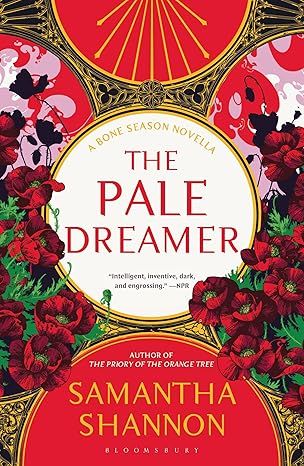
The Pale Dreamer: A Bone Season novella (The Bone Season)
4.4
-
1,059
$1.99
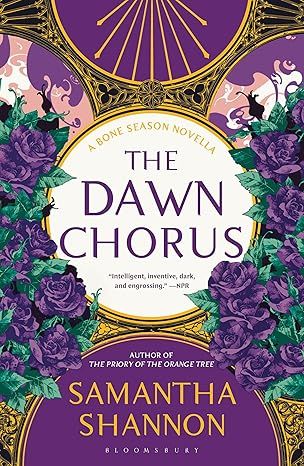
The Dawn Chorus: A Bone Season novella (The Bone Season)
4.4
-
1,195
$1.99
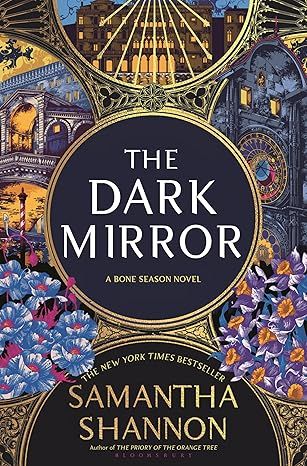
The Dark Mirror (The Bone Season, 5)
4.6
-
137
$13.43
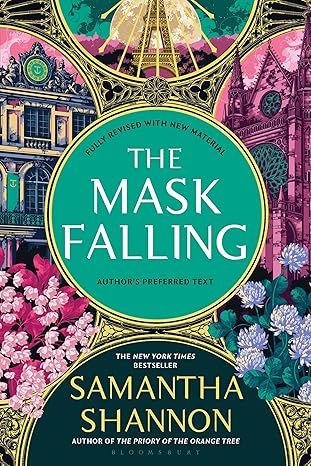
The Mask Falling (The Bone Season, 4)
4.5
-
1,559
$8.21
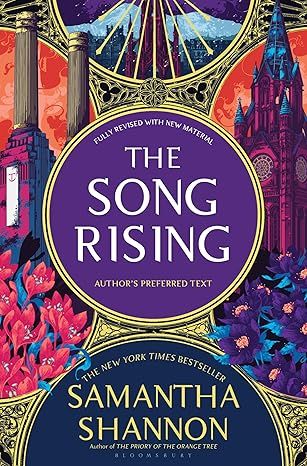
The Song Rising (The Bone Season Book 3)
4.4
-
2,654
$9.49
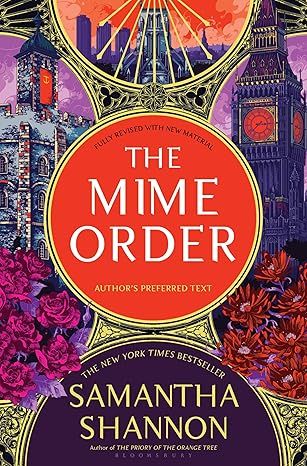
The Mime Order (The Bone Season, 2)
4.5
-
3,172
$8.30
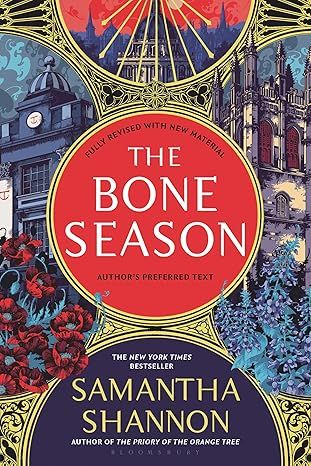
The Bone Season: Author's Preferred Text (The Bone Season, 1)
4.2
-
4,555
$11.99
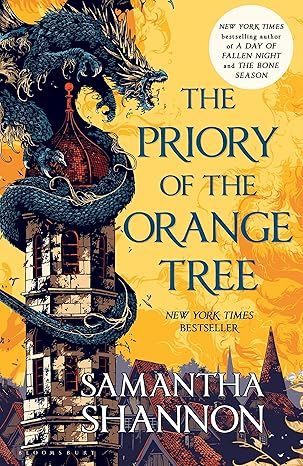
The Priory of the Orange Tree (The Roots of Chaos)
4.5
-
20,268
$8.48
Similar Books
Best sellers
View all
The Tuscan Child
4.2
-
100,022
$8.39

The Thursday Murder Club: A Novel (A Thursday Murder Club Mystery)
4.3
-
155,575
$6.33

Sapiens: A Brief History of Humankind
4.6
-
140,302
$13.49

The Butterfly Garden (The Collector, 1)
4.3
-
88,556
$9.59

Things We Hide from the Light (Knockemout Series, 2)
4.4
-
94,890
$11.66

The Last Thing He Told Me: A Novel
4.3
-
154,085
$2.99

The Perfect Marriage: A Completely Gripping Psychological Suspense
4.3
-
143,196
$9.47

The Coworker
4.1
-
80,003
$13.48

First Lie Wins: A Novel (Random House Large Print)
4.3
-
54,062
$14.99

Mile High (Windy City Series Book 1)
4.4
-
59,745
$16.19

Layla
4.2
-
107,613
$8.99

The Locked Door
4.4
-
94,673
$8.53
